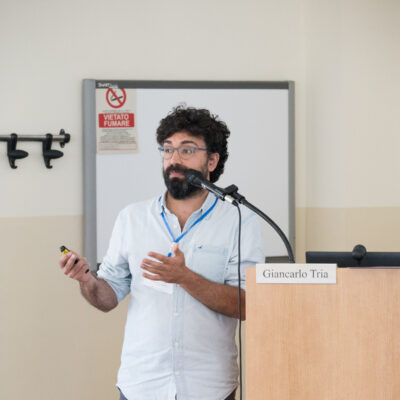Dirigente Tecnologo
Tria Giancarlo
Caserta

Giancarlo Tria got his degree in Computer Science at the University of Bari (Italy) in 2010, defending a thesis in artificial intelligence applied to biomedical documents entitled “Automated Generation of a Knowledge Base from Biomedical Documents” – under the supervision of Prof. Donato Malerba. Starting in 2008, he was also employed as fellowship researcher at MBLab (Molecular Biodiversity LABoratory) c/o IBM Italy, in Bari.
Between 2010 and 2014 he gained a PhD at EMBL Hamburg (P12 beamline, BioSAXS group), defending a final thesis in “Joint use of Small Angle X-ray Scattering with high resolution methods to study flexible biological macromolecules”. PhD evaluation committee included: Dmitri Svergun (EMBL Hamburg), Victor Lamzin (EMBL Hamburg), Gerard Kleywegt (EMBL-EBI Cambridge), and Prof. Andrew Torda (University of Hamburg). In 2014 he was also visiting researcher in the group of Prof. Gerhard Grüber at Nanyang Technological University (NTU, Singapore) where he contributed, both experimentally and computationally, to the optimization of the in-house BioSAXS instrumentation for studies investigating Dengue virus infection.
Since 2015 he embraced transmission electron cryo-microscopy (cryoTEM) on proteins initially as post-doc at Maastricht University – under the supervision of Prof. Raimond Ravelli – and afterwards as cryoTEM scientist at Sosei Heptares (now Nxera Pharma, Cambridge, UK). In 2019 he joined the Chemistry Department of University of Florence (Italy) where he contributed to the design, set up and daily management of the newly established public access electron cryo-microscopy facility for the structural characterization of (macro)molecules and soft matter (FLOrence Center for Electron Nanoscopy, FloCEN, www.flocen.unifi.it).
In May 2023 he joined CNR-IC URT Caserta as Infrastructure Manager of the PNRR project ITACA.SB (www.itaca-sb.it).
He is member of the AIC.
Computational and experimental structural biologist with (about 15 years) experience in multimodal data-driven macromolecular modelling combining data from complementary structural biology techniques, i.e. Transmission Electron cryoMicroscopy (cryoTEM), X-ray crystallography (MX), Small Angle X-ray Scattering on macromolecules (BioSAXS), and structural bioinformatics.
Artificial intelligence specialist by training (shallow learning, deep learning, data & text mining, pattern recognition, knowledge representation and reasoning, backtracking/heuristic algorithms) passionate about molecular modelling, structure-based drug discovery and biomedical data.



